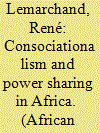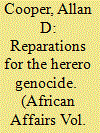|
|
|
Sort Order |
|
|
|
Items / Page
|
|
|
|
|
|
|
| Srl | Item |
| 1 |
ID:
077655


|
|
|
|
|
| Publication |
2007.
|
| Summary/Abstract |
Although there are obvious merits to the consociational argument, including the need to recognize the claims of minorities through power-sharing arrangements, translating theory into practice has generally failed in much of Africa. The reasons for this are many and are by no means reducible to single-factor explanations. Looking at the recent experiments in power sharing in former Belgian Africa, this article offers a comparative assessment of the radically different trajectories followed by Rwanda, Burundi, and the Democratic Republic of the Congo (DRC) in their efforts to regulate conflict through consociational formulas. Although Rwanda stands as a textbook example of failed power sharing, and the DRC as a less than successful experiment, Burundi, which comes nearest to institutionalizing the Lijphart model, offers grounds for cautious optimism about the merits of a consociational polity. On the strength of the evidence from Burundi, one might conceivably argue that the key to success lies in the extent to which the technicalities of power sharing tend to approximate the conditions spelled out by Lijphart, notably group autonomy, proportionality, and the minority veto. Closer scrutiny of the cases at hand suggests a somewhat different conclusion. Perhaps even more importantly than the mechanics of power sharing, the socio-political context is what spells the difference between success and failure
|
|
|
|
|
|
|
|
|
|
|
|
|
|
|
|
| 2 |
ID:
077656


|
|
|
|
|
| Publication |
2007.
|
| Summary/Abstract |
In May 2005, the government of Zimbabwe launched Operation Murambatsvina (OM), a state-sponsored campaign to stifle independent economic and political activity in the country's urban areas. This article employs a national probability sample survey to analyse the popular reactions of ordinary Zimbabweans to this landmark event. It shows that the application of state repression succeeds at some goals, fails at others, and has powerful unintended effects. We report that the scope of OM was wide and that the main victims of OM were younger, unemployed families whom state security agents saw as potential recruits for social unrest. Whereas OM undoubtedly disrupted the informal economy, we show that it did not succeed in banishing urban dwellers to rural areas or permanently shutting down illicit trade. Moreover, the crackdown thoroughly discredited the police and other state institutions. We also demonstrate that state repression emboldened its victims, deepening polarisation between political parties and fortifying the ranks of Zimbabwe's opposition movement
|
|
|
|
|
|
|
|
|
|
|
|
|
|
|
|
| 3 |
ID:
077660


|
|
|
|
|
| Publication |
2007.
|
| Summary/Abstract |
The Herero were the first ethnic group to be subjected to genocide in the twentieth century. In 2001, the Herero became the first ethnic group to seek reparations for colonial policies that fit the definition of genocide. The Herero are the latest plaintiff to use the procedures of the Alien Torts Claim Act of 1789 to seek reparations in a US federal court for war crimes committed overseas. This article analyzes the legal arguments by Hereros against Germany within the context of current understandings of international law and identifies the challenges that lie ahead for this claim. The article also explores the implications of the Herero claim for other ethnic groups victimized by colonization.
|
|
|
|
|
|
|
|
|
|
|
|
|
|
|
|
| 4 |
ID:
077659


|
|
|
|
|
| Publication |
2007.
|
| Summary/Abstract |
This article examines the relationship between chiefdom authority and decentralization in post-war Sierra Leone. The chieftaincy has been in crisis for some time and is widely thought to be responsible for contributing to rebel Revolutionary United Front (RUF) recruitment. However, chiefs remain an important influence in Sierra Leone, and there is little demand for an end to the chieftaincy system. Rather than an abolition of chieftaincy, governance at local level requires constructive relationships between chiefdoms and local governments and not simply a reshuffling of agrarian class relationships or old ways of doing politics. This in turn requires a reform of the chieftaincy system and the resolution of local political tensions arising from decentralization
|
|
|
|
|
|
|
|
|
|
|
|
|
|
|
|
| 5 |
ID:
077657


|
|
|
|
|
| Publication |
2007.
|
| Summary/Abstract |
Kennedy Agade Mkutu is a former lecturer with the Kenya Institute of Administration and is currently a consultant with Peace and Conflict Transfomation.
Recent decades have seen an escalation in interethnic resource conflicts and banditry among pastoralists in the Kenya-Uganda border region, fuelled by a growing number of small arms. State management has been largely unsuccessful and often counterproductive in reducing numbers of small arms. The creation of paramilitary institutions in rural Kenya and Uganda are an example of how legal arms are entering communities and intensifying the conflicts further. Understanding the sources and mechanisms of arms acquisition is a significant step in curbing the violence. The main sources and routes, and the current costs of arms and ammunition are provided. More important however is to appreciate the complex reasons behind the demand for small arms. Relationships with states, alienation of pastoral land, cultural issues and questions of livelihood are all examined, using empirical evidence collected by the author between 2001 and 2005.
|
|
|
|
|
|
|
|
|
|
|
|
|
|
|
|
| 6 |
ID:
077658


|
|
|
|
|
| Publication |
2007.
|
| Summary/Abstract |
The 1980s marked the beginning of a significant shift in the pattern of Dagaaba migration to southern Ghana. Instead of the mining centres of Obuasi (Ashanti region) and Prestea and Tarkwa (Western region) respectively, many Dagaaba men and women have been migrating to predominantly agricultural areas in the Brong Ahafo region. There is also evidence that Dagaaba migrants, who previously worked in the southern and coastal regions, have been relocating to the Brong Ahafo region when they either lost their jobs or retired. This article explores the factors that have culminated in the mass movement of Dagaaba men and women to the Brong Ahafo region and the reasons why 'step' Dagaaba migrants are relocating to the Brong Ahafo region in large numbers instead of going back home (to the north) as many of their predecessors did. The article adds to the ongoing discussion on the migration phenomenon in sub-Saharan Africa by foregrounding the internal ways in which communities themselves shape migration through extended, gendered social debates over production and reproduction
|
|
|
|
|
|
|
|
|
|
|
|
|
|
|
|
|
|
|
|
|